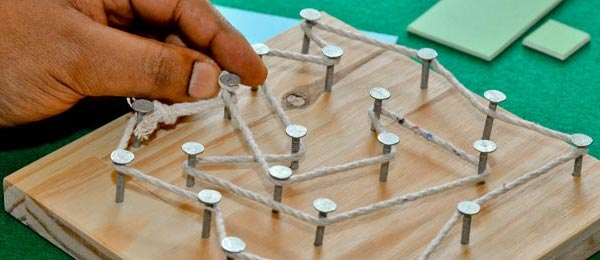The Société informatique de France (SIF) organized on June 15 in Paris at the Gaîté Lyrique an " Info Sans Ordi" day. Throughout the day, participants (mainly teachers) were able to try out activities led by researchers and computer scientists specializing in unplugged computing: "Light sleepers", "The blind barmaid with boxing gloves", "Systolic sorting", "Hide and seek with RAM", "AI with cups", "Elastic routing", "Binary magic tricks", "Alice moves".
The unplugged computer
Based on Tim Bell's work, some New Zealand computer scientists have set up a few years ago a program to teach the basics of computer science, Computer Science Unplugged, with the idea of transmitting some basic notions in a playful way, and without any recourse to the computer. They succeeded in showing how, if you can spend hours clicking on a mouse without learning anything about computers, you can also learn a lot about computers without touching a mouse.According to Serge Abiteboul, Director of Research at INRIA and holder of the Chair of Computer Science and Digital Science at the Collège de France in 2011-2012, "computer science is not just the science of computers. Teachers are also discovering it, especially in primary schools, through "unplugged computing". Pupils learn, far from any computer, around games, the notions at the heart of computer science, such as information and its communication, algorithms and the resources they require.
According to Baptiste Mélès, " computer science has the unfortunate reputation of being the science of computers. Whatever his specialty, a "computer scientist" will always be called upon to repair his brother-in-law's computer. In a very stimulating article, published by the CNRS journal Images des Mathématiques, he sets out to show "that a significant part of the concepts and methods of the discipline of computer science is independent of the world of computers ... that the Internet can be made to work with carrier pigeons, that algorithms can speed up the search for a word in the dictionary, and that it is sometimes useful to do programming on paper.
In France, and in particular in Clermont-Ferrand, primary school teachers, secondary school mathematics teachers and academics (computer scientists, mathematicians and computer science didacticians) are working on the concept of computer science without computers as an approach to teaching computer science, complementary to the classical approach.
"The guiding idea is to teach basic computer science concepts in a playful way, without any use of digital objects. Instead, cards, tokens, cups, marbles, etc. are used. The emphasis is on the scientific content, without being dazzled or put off by the technology.Références :
Sources
- 1. Société informatique de France (SIF): Info Sans Ordi day June 15, 2019
- 2. Institute for Research on Mathematics of Clermont-Ferrand (IREM) and Maison pour la science en Auvergne (MPSA): " Faire de l'informatique sans ordinateur à l'école et au collège
- 3. Serge Abiteboul: Computers without computers
- 4. Baptiste Mélès : Computers without computers
- 5. Resources on Pixee





